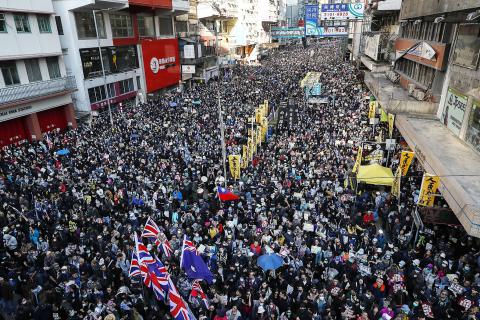Hundreds of thousands of demonstrators yesterday crammed into Hong Kong’s streets, their chants echoing off high-rises, in a mass show of support for a protest movement that shows no signs of flagging as it enters a seventh month.
Chanting “Fight for freedom” and “Stand with Hong Kong,” a sea of protesters formed a huge human snake winding for blocks on Hong Kong Island, from the Causeway Bay shopping district to the Central business zone, a distance of more than 2km.
The crowds were so large and dense that the march ground to a standstill at times. Protesters spilled into narrow side streets, crying “Revolution in our times.”

Photo: AP
One protester crawled part of the route prostrated on her hands and knees, dragging bricks and empty soda cans behind her. It was an apt metaphor for the pro-democracy movement, which has become a long-haul push to preserve Hong Kong’s freedoms that make it unique among China’s territories.
“This is just the beginning. We have a long way to run,” said demonstrator Louisa Yiu, an engineer.
Many marchers held up five fingers to press the movement’s five demands. They include democratic elections for Hong Kong’s leader and legislature and a demand for a probe of police behavior during the six months of continuous protests.
Marchers said they hoped the huge turnout might help win concessions from the government of Hong Kong Chief Executive Carrie Lam (林鄭月娥).
Protesters spanned generations. One man’s young son marched in his Spider-man suit.
“So many people are still supporting this movement. You can see how determined Hong Kong people are,” said demonstrator Justin Ng, a 20-year-old student.
“I heard a small kid yelling slogans — four, five years old,” Ng said. “That really encouraged me, because it’s not just this generation, but future generations, too.”
Marchers said protesting has become part of the fabric of their lives since demonstrations erupted in June against a now-withdrawn bill that would have allowed criminal suspects to be sent for trial in Chinese Communist Party-controlled courts in China.
The protests have since snowballed into a broad, sustained anti-government movement, presenting the communist leadership in Beijing with a major headache and battering Hong Kong’s economy.
Police in riot gear deployed in numbers on the edges of the march.
Earlier in the day, they arrested 11 people and seized a cache of weapons, including a firearm with more than 100 bullets.
Police said the suspects apparently planned to use the weapons during the protest to frame police, who have been accused of using excessive force against the protesters.
Civil Human Rights Front vice convener Eric Lai (黎恩灝) called for police restraint and for no use of tear gas.
“We hope this will be a signature for our movement after six months to show to Carrie Lam as well as to the world that people are not giving up. People will still fight for our freedom and democracy,” Lai said.
Chief among the protesters’ complaints yesterday was that police have been overly heavy-handed, making thousands of arrests since June.
“They are out of control,” said Ernest Yau, a 28-year-old consultant.
“We understand our common enemy,” he said. “We understand that we have to be united to fight against China.”

The CIA has a message for Chinese government officials worried about their place in Chinese President Xi Jinping’s (習近平) government: Come work with us. The agency released two Mandarin-language videos on social media on Thursday inviting disgruntled officials to contact the CIA. The recruitment videos posted on YouTube and X racked up more than 5 million views combined in their first day. The outreach comes as CIA Director John Ratcliffe has vowed to boost the agency’s use of intelligence from human sources and its focus on China, which has recently targeted US officials with its own espionage operations. The videos are “aimed at

STEADFAST FRIEND: The bills encourage increased Taiwan-US engagement and address China’s distortion of UN Resolution 2758 to isolate Taiwan internationally The Presidential Office yesterday thanked the US House of Representatives for unanimously passing two Taiwan-related bills highlighting its solid support for Taiwan’s democracy and global participation, and for deepening bilateral relations. One of the bills, the Taiwan Assurance Implementation Act, requires the US Department of State to periodically review its guidelines for engagement with Taiwan, and report to the US Congress on the guidelines and plans to lift self-imposed limitations on US-Taiwan engagement. The other bill is the Taiwan International Solidarity Act, which clarifies that UN Resolution 2758 does not address the issue of the representation of Taiwan or its people in

US Indo-Pacific Commander Admiral Samuel Paparo on Friday expressed concern over the rate at which China is diversifying its military exercises, the Financial Times (FT) reported on Saturday. “The rates of change on the depth and breadth of their exercises is the one non-linear effect that I’ve seen in the last year that wakes me up at night or keeps me up at night,” Paparo was quoted by FT as saying while attending the annual Sedona Forum at the McCain Institute in Arizona. Paparo also expressed concern over the speed with which China was expanding its military. While the US

SHIFT: Taiwan’s better-than-expected first-quarter GDP and signs of weakness in the US have driven global capital back to emerging markets, the central bank head said The central bank yesterday blamed market speculation for the steep rise in the local currency, and urged exporters and financial institutions to stay calm and stop panic sell-offs to avoid hurting their own profitability. The nation’s top monetary policymaker said that it would step in, if necessary, to maintain order and stability in the foreign exchange market. The remarks came as the NT dollar yesterday closed up NT$0.919 to NT$30.145 against the US dollar in Taipei trading, after rising as high as NT$29.59 in intraday trading. The local currency has surged 5.85 percent against the greenback over the past two sessions, central